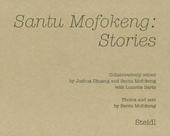
|
Santu Mofokeng: Stories
Hardback
Main Details
Description
Heralded for his nuanced and penetratingly ambivalent portrayals of township life in South Africa, Santu Mofokeng fi rst made his name as a member of the Afrapix collective, then as a documentary photographer for the African Studies Institute at Wits University, and fi nally as an independent artist. This groundbreaking series of publications is the result of an unlikely multi-year collaboration between the photographer, bookmaker Lunetta Bartz, editor/curator Joshua Chuang and Gerhard Steidl. Together they have carefully mined and distilled over 30 years of work into 18 defi nitive "stories" that are sharply edited, simply presented and richly printed in an oversized format that recalls the golden age of picture magazines. The stories range in subject from the zealous expressiveness found in "Train Church" and "Pedi Dancers," and Mofokeng's complex, long-form depiction of late-twentieth-century indentured servitude in "Labor Tenancies," to the contested spaces of "Robben Island," "Trauma," "Landscapes" and "Billboards." The majority of the pictures appears here for the fi rst time. Taken together, they reveal the achievement of a major artist of, and for, our times.
Author Biography
Santu Mofokeng was born in Johannesburg afterwards in 1956. After working as a darkroom assistant for various newspapers, he joined Afrapix, a collective of photographers dedicated to the struggle against apartheid. His interest in depicting ordinary township life, however, led him to work for the African Studies Institute at Wits University from 1988 until 1998. Over the past three decades, Mofokeng has created an exceptional, open-ended body of work that probes the meaning and authority of photography while subverting stereotypical notions of the black South African experience. In 2011 a retrospective of Mofokeng's work opened at the Jeu de Paume in Paris before traveling internationally, and in 2013 he represented Germany at the Venice Biennale.
ReviewsStories" acknowledges that Mofokeng was a documentarian who resisted easy categorization, creating an oeuvre that tackled monumental topics while retaining a sense of fluidity and poetry--Oluremi C. Onabanjo "New Yorker"
|